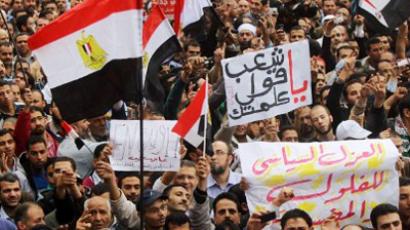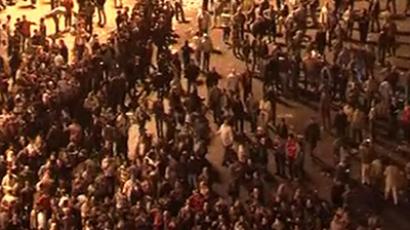West’s fixation on Assad eclipses bloody chaos in Egypt
The bloody chaos engulfing Egypt again, just months after its first revolution toppled President Hosni Mubarak, is the focus of the world’s media spotlight. But Western leaders are turning a blind eye, instead setting their sights on pastures new.
It seems the bogeyman of the moment is another Middle Eastern country. “Abuses and loss of life are taking place in Syria,” says British Foreign Secretary William Hague. "The future of Syria now depends upon the ability of all us to keep pressure on them,” says EU Foreign Policy Chief Catherine Ashton.“We've called on President Bashar al-Assad to make reforms,” says French Foreign Secretary Alain Juppe.Around 30 people have died in Cairo’s clashes already, and it has been all over the international media. When a crackdown of this scale took place in February, it received international condemnation. What is the difference this time? Those in power, of course.“It is Western double standards at work, par excellence,” says British MP Jeremy Corbyn. “They invaded Libya in order to change the government because of threats against the people of Benghazi. They have put sanctions against some countries because of oppressions of civil liberties. I think the West basically is quite happy to carry on with a military structure that will do deals with them.”Since President Mubarak was forced out nine months ago, Egypt has been under the rule of the Supreme Military Council. Thousands of activists unhappy with the slow pace of reform have returned to relive their Tahrir triumph, only to be met by tear gas and bullets.Protesters now accuse the Western nations that were previously supportive of having a hand in the crackdown.“I am not expecting a quick reaction from the West,” says political activist Ahmed Salah. “We can see that all the ammunition used against us is either American or Israeli or actually Italian, whether it is the tear gas canisters or the bullets. All the ammunition that they have received is 2011. It is post – presumably – revolution, and is being used for oppressing the population, used to kill this revolution.”For the likes of Britain, France and America though, Egypt is no longer a problem. The next stop is Syria. The UK’s Foreign Secretary William Hague met Syrian opposition groups in London this week and Prime Minister David Cameron has been picked to spearhead an international diplomatic taskforce with one aim – to remove President Assad from office.The move mirrors similar attempts in Egypt and Libya – precedents some say clearly should not be followed.“After Libya becoming a bloodbath and now with Egypt showing what it was all along – there was no revolution there, it was a complete failure, and now people are beginning to understand that,” says author and journalist Webster Tarpley. “Nevertheless, Mrs. Clinton and Ms. Rice continue to push this bankrupt, discredited model of the color revolution backed up by terrorist troops – people from Al-Qaeda, people from the Muslim Brotherhood.”The military council in Egypt has said it will speed up presidential elections. But for protesters, that is clearly not enough. They have not forgotten what their revolution was about even if it seems the international community has.
Political analyst and activist Chris Knight has told RT he believes “what is happening in Egypt [is] the beginning of a massive global uprising” against dictatorships all across the world. “I am sure the immediate effect in Tunisia, maybe in Libya, will be more direct,” he said. “Clearly the people have realized that they’ve got to free themselves from any regime which has at its core a body of armed men. Until the soldiers begin to mutiny and disobey criminal orders from their superiors, and join with the people, this revolution will not be completed.”Knight says that now everything possible needs to be done “to prevent the West from doing to the Egyptian revolution what they did in Libya.”
"We are seeing NATOsation of the entire Muslim world,” political analyst William Engdahl told RT. “I suspect the long arm of Washington is meddling around with this and a very calculated response of the White House. Today it is tense to confirm that,” he said.














